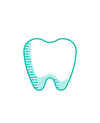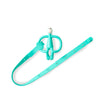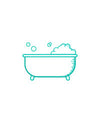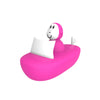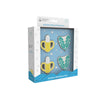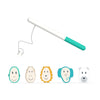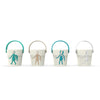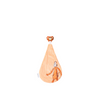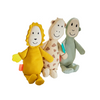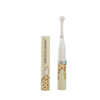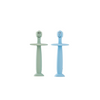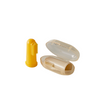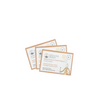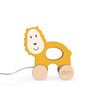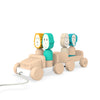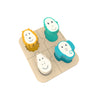When Will My Baby Start Teething? And Other Teething Questions Answered.
Teething is a definitive point in almost every baby’s life, so it’s natural that as parents we have so many questions about it. Even if like me, you’ve been through the teething period with one or more children already - each experience can be different! When it comes to teething there’s no manual you can stick to. A bit like most things when it comes to bringing up children!
I created Matchstick Monkey when my first baby was teething, so, I know how frustrating not knowing how to help your child can be. Especially if they seem uncomfortable!
With that in mind, I’ll try to answer some of the most common questions about teething to help you figure out what's right for your individual baby.
When will my baby start teething?
There isn’t an exact age that your baby’s teeth should start appearing but there are some general guidelines. The first teeth most commonly start emerging between 4 to 6 months of age, but teeth can erupt earlier or later.
It’s thought that the age that your baby begins to teeth is hereditary. If you or your husband started to teeth early or late, your baby could take after you. If baby doesn’t follow the family teething history though (or you just can’t remember - I can’t and neither can my parents), it’s no cause for concern. All of my little ones got teeth at slightly different times, so there are no hard and fast rules.
My baby is 18 months old but still doesn’t have any teeth. Is this normal?
If none of your baby's teeth are showing by 12 months, they’re considered a late teether. You can always make an appointment with your family doctor if you’re worried. By 18 months, if no teeth have emerged then you may be referred to a paediatrician to confirm the presence of teeth in the mouth.
When will my baby have all their first teeth?
By the time your baby is three years old they should have a complete set of cute baby teeth. Even though there’s another set to come, make sure they’re brushing their teeth well, and regularly.
Can a 2-month-old baby be teething?
Yes. Although this would be considered very early, it’s possible for babies 2 and 3-months-old to begin the teething process.
In what order will my baby’s teeth emerge?
Your baby will develop five different types of teeth in their first three years. Baby’s don’t always get their teeth in exactly the same order so don’t worry if it doesn’t happen in this exact order - but they generally follow a similar pattern.
- Central incisors (front teeth)
- Baby’s will usually get their bottom front teeth first
- First molars
- Canines (next to the front molars)
- Lateral incisors (between central incisors and canines)
- Second molars
How long do symptoms of teething last?
Firstly, symptoms of teething don’t last for the entire time between a baby’s first and last tooth erupting. They come and go as each tooth pushes through the gum. As teeth don’t all come through together, this process can continue on and off until all your baby’s teeth are through.
Sometimes a baby can have several teeth emerge at once or in quick succession, so symptoms may even last a few months at a time. There will be times when teeth come through more easily and there is little pain (although all of my children seemed to experience some discomfort). There may also be times when your baby’s gums will feel irritated whatever you do!
To make things even more confusing, some lucky babies (and parents) don’t experience any of the usual signs of teething and breeze right through!
What are the first signs and symptoms of teething?
As we mentioned before, some babies may get none of these symptoms but others may get more than one. Some of the most common signs of teething are:
- Drooling
- Bulging gums (they may also be swollen)
- A tooth visible below the gum
- Irritability
- Trouble sleeping
- Trying to put everything into their mouth to chew
- Rubbing their face
- Not eating or rejecting food
- Grabbing their ears and/or face
Tips to help and alleviate symptoms of teething?
If you want to find something to help your baby through teething, especially if they’re uncomfortable - read 5 Healthy Teething Solutions for your Baby and 5 Handy Tips for Parents with Teething Babies for some more really useful tips!

